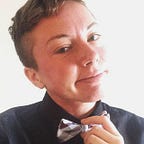A few tips on choosing a grad program for LGBTQ+ students (in STEM)
It’s that time of year: graduate school admissions season! And there are probably many of you with the question, “how do I tell if a school is a good fit?”
For most students, this question is probably focused on research areas and career goals. For LGBTQIA+ students, this can mean a lot more: is the department going to be a safe and comfortable place to be “out?” Is there any sort of queer/trans community in the local area? Will I have access to trans-inclusive healthcare? How do I even find answers to these questions?
If you’re going to a PhD program, you will be in that department for 5+ years and living in that area for just as long. These questions matter. They will deeply affect your quality of life. Everyone will have a different perspective on how important queer spaces versus research subjects versus funding are to them. That’s something you have to weigh for yourself. I’m just going to provide some unsolicited advice on how to tell how queer/trans friendly a department may be.
These are questions that I get asked a lot, so I’ve decided to finally put the answers in writing. In all fairness, this is something that I should have done months ago during application season, but hindsight is 20/20. Also, I am in STEM (particularly in astro/physics) and in the US, so that is the experience I will speak to. This advice may apply more broadly though.
Best ways to find out if a department is LGBTQIA+ friendly
Ask a queer/trans person who has been in that department. The easiest way is to check the “outlist” for your field or prospective university. And remember: check for people’s past affiliations, not just their current departments! For example, I am currently at Michigan State University, but I can also speak to the climate of the physics department at Notre Dame, where I did my PhD.
My caveat for this is that folks can’t always speak to the friendliness toward all LGBTQIA+ identities. Cis LGB folks can’t speak to trans inclusion, the experiences of queer men and queer women may be vastly different, white queer/trans people will have different experiences than queer/trans POC, etc, etc.
You can find outlists for physics and astronomy. There are also several universities than maintain their own outlists. A little googling should tell you if your prospective university has one.
Email the listserv in your field. The AAS Committee for Sexual-orientation and Gender Minorities in Astronomy (SGMA) maintains a listserv. Send an email around and ask if anyone has any insight into the department(s) you’re interested in. There’s a lot of institutional memory there and people know which departments have driven LGBTQIA+ students away, which of their colleagues are supportive, and which to avoid. Again, a little googling should tell you whether your field has such a listserv.
Get in touch with the LGBTQ center on campus. Often these centers cater to undergrads, so they may not be super helpful. But sometimes they have graduate-focused or identity-specific groups that may be useful to you. And they will definitely be a good resource for finding out if the university insurance covers trans-inclusive healthcare and whether there are doctors/specialists in town who work with trans patients.
Dig into health care coverage. There’s a current effort to crowdsource and centralize info on health insurance coverage for grad students, including info on trans-inclusive coverage.
Utilize your recruitment weekend. If you go for a visit weekend to the department, look around! Are there other queer/trans folks there? More than one? If so, do they come to department recruitment events? (This last can speak volumes to the level of inclusion in the department.) Are there LGBTQIA+ “safe space” stickers on people’s doors? I wouldn’t take “safe space”/ally training stickers as proof that there are no problems, but it at least shows that people are thinking about these issues.
Come out. Now this advice won’t work for everyone. You should never come out to anyone if you don’t want to or feel comfortable doing so. Don’t feel obligated to come out to anyone in a department you’ve been accepted to, even if they’re asking pestering questions about significant others, etc. You don’t owe them that. However, it is possible to use this as a way to gauge comfort and gather information. For example, when I was applying for postdocs, I came out to the PIs after I received job offers as a way to ensure it was going to be a comfortable work environment. Their reactions told me a lot. You may consider coming out to faculty that you’re interested in working with, or graduate students in the department who may have a sense of how friendly and inclusive it is.
If you’re there on a visit weekend and coming out makes it a hostile environment, don’t feel obligated to continue going to recruitment events. The department may be paying for your trip, but you don’t owe them anything so don’t feel obligated to put yourself in uncomfortable or unsafe situations. They’re supposed to be catering to you on these visits, to make you want to come to their department. If they make you feel uncomfortable or unsafe, that’s on them. Not on you.
I also want to recognize that there are a lot of folks (especially those of us who are trans) who may not be able to help coming out to their prospective departments, due to name changes/gender markers/pronouns in letters of recommendation.
I don’t want to begin to pretend this is a comprehensive list — these are just tactics I have employed in the past. If you have other ideas, approaches, or resources, please reach out and I’ll add them to this list!
